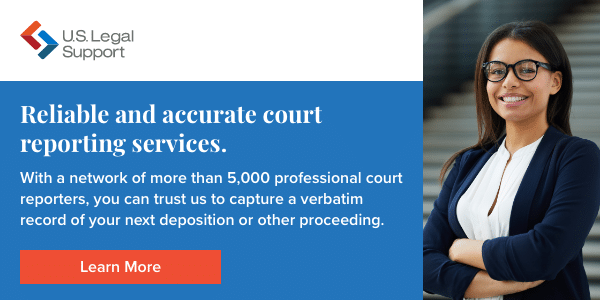A Guide to the Deposition Process

More than a meeting but less than a trial—depositions are key building blocks to civil and criminal cases. Depositions are usually scheduled to interview your opposition’s witnesses, but as an attorney, you may also depose your own witnesses, in addition to less formal and off-the-record trial preparation.
Before attending a deposition, everyone involved must understand the formal deposition process and how to effectively prepare. To that end, we’ve created the following guide to the deposition process that you can share with your clients and witnesses.
What Is a Deposition?
Before ever setting foot in the courtroom, the discovery phase of a civil lawsuit or criminal case occurs.
Discovery is a formal stage of investigation wherein both sides gather information. Depositions are the official meetings scheduled during discovery where witnesses for either side are sworn in and questioned at length. Depositions serve to:
Prepare for Trial or Settlement
Legal teams depose anyone who will provide direct or expert testimony and speak to exhibits in a legal case. This ensures the legal team knows about every detail of information and each piece of evidence before going to court.
Ultimately, depositions are used to:
- Avoid surprises and confusion during a trial
- Help lawyers to decide on trial strategies and prepare arguments
- Provide the basis to negotiate settlements rather than proceeding to trial
Preserve Testimony
Depositions are used as a way to preserve testimony:
- To document information under oath
- If a material witness cannot be located or is unwilling or unable to testify during the trial
- In case of the death of a witness prior to the trial
State law, differences between civil and criminal court, and which side the witness testifies for all affect when and how a deposition transcript can be used in a courtroom.
Impeach Witnesses
The third key use of depositions is to impeach witnesses who contradict their sworn testimony in court.
Individuals are sworn in by the court reporter during the deposition, and if their story changes on the witness stand, attorneys may introduce a deposition transcript to share their original testimony and identify an inconsistency, error in memory, or lie.
How Does a Deposition Work?
Depositions are often held in lawyers’ offices or in a neutral third-party space, such as at the office of a litigation support services provider.
People in the room during a deposition generally include:
- The attorney who scheduled the deposition
- The deponent (witness)
- The deponent’s attorney
- A court reporter
- Legal videographer (optional)
If it’s known that the witness may be unable to attend a criminal trial, then the accused may also be in attendance and even be allowed to take part in questioning directly.
Note that there is no judge present for a deposition.
The deposition process includes these steps:
#1: Swearing in the Witness
The court reporter swears in the witness and gets their identification details on record. Prior to being under oath, any information provided is unable to be entered as part of an official record.
It’s important to note that the swearing-in process does not have to be done in person; it can occur remotely and across state or international borders.
#2: Witness Instruction
Usually, the witness is provided with some explanation or instructions before questioning begins. As an attorney, this is the time to remind your witness that:
- They can ask for clarification or rephrasing if a question doesn’t make sense
- Everything they say is under oath, and there may be legal penalties for lying
- Providing an answer serves as acknowledgment that they understand a question
#3: Attorney Examination
The deposing attorney will then pose questions to the witness. During a deposition, attorneys have a lot more latitude in the scope of their questions than in a courtroom, and the witness is required to provide a truthful answer (even if it’s “I don’t know” or “I don’t remember”) for most questions.
The witness or their attorney can also object to a question that’s improper or irrelevant to the case, although the deposition’s purpose of gathering as much information as possible may mean that the deposing attorney is able to present a reason for it and require a response. However, a question that’s answered during a deposition may later be ruled inadmissible by a judge.
#4: Opposing Attorney Cross-Examination
Similar to a courtroom proceeding, opposing attorneys have the option of cross-examining the witness once the deposing attorney is done with direct examination. This can serve to:
- Clarify previous answers
- Provide mitigating factors to information perceived as detrimental
- Explain previous yes or no answers
This may end the deposition, or it may move on to include steps 5 and 6.
#5: Deposing Attorney Redirect
The initial attorney may want to follow up the cross by asking additional questions or clarifying cross-examination answers further.
#6: Opposing Attorney Re-Cross
Finally, the opposing attorneys can cross-examine the redirect if needed.
What Happens After a Deposition?
If ordered by the attorneys, a court reporter can generate a realtime transcript during the deposition. Whether this is requested or not, there will be a final edit and review before the official transcript is complete and certified.
The deposition transcript will then be reviewed by the attorneys, discussed with clients, and incorporated into trial planning or settlement negotiation.
Common Questions About Depositions
While depositions may be run-of-the-mill for lawyers and court reporters, most laypeople only have movies and television as a reference for how a civil procedure works. Ensuring clients and witnesses know what to expect is critical to a smooth deposition process.
Below are the answers to some commonly asked questions you may need to field:
Do I Have to Attend?
In short: yes. A witness may receive a notice, summons, or subpoena to appear at a deposition, and refusal to comply can result in significant legal penalties. The court may:
- Render judgment by default against the no-show party
- Refuse to allow evidence that should’ve been investigated during deposition
- Find them in contempt of court and impose fines and/or jail time
What Should I Wear?
Aim for business casual: conservative slacks, dress shoes, and dress shirts with long sleeves in neutral colors. Avoid:
- Flip-flops or sandals
- Jeans, shorts, or capri pants
- T-shirts or tank tops
- Clothing with statements or images
- Hats or headgear
- Flashy, oversized, or excessive jewelry or accessories
What you wear still stands for virtual depositions. It may also be advisable to remove non-ear piercings and minimize the display of tattoos. Sometimes an entire deposition is recorded, and it’s possible that video clips may be shown to the judge or court.
What Do I Need to Bring?
Deponents should bring a current photo ID, such as a driver’s license or passport. Other documents should be reviewed and approved by the deponent’s legal counsel. Any notes, diaries, calendars, or other records a client consults during deposition testimony may potentially be examined by opposing attorneys.
If asked to provide any documents, bring the original plus three copies of each. The original serves as a reference if any copies are unclear or if the document’s origin is called into question. The copies are for use by the witness, the deposing counsel, and the opposing counsel.
An expert witness may also need to bring:
- Proof of expertise, such as a CV with certifications, experience, published papers, etc.
- Relevant reports or findings
- Annotations and source materials for the findings
- Timelines, drafts, and original notes
- Related foundational materials (textbooks, treatises, research studies, etc.)
Expert witnesses should have the legal team that called upon them review and approve what they bring to a deposition.
What Time Should I Arrive?
Clients should plan to arrive at least 15 minutes ahead of the deposition’s start time. This provides the opportunity to find a restroom, get water, and locate the correct meeting room.
Plus, being in a rush and hurrying into the meeting will put you at a deficit emotionally and physiologically during a time when keeping calm is critical.
How Long Will It Last?
Under federal law, a deposition is typically limited to a seven-hour period during one day, and many states follow this standard. If more time is needed, the deposing attorney either needs to gain the witness’s consent or obtain a court order.
Tips for Deposition Preparation
To ensure your clients and witnesses know how to prepare for a deposition, consider sharing the following quick tips:
- Always tell the truth (even if that means saying “I don’t know”)
- Ask for clarification or rephrasing if you don’t understand the question
- Answer questions concisely without offering additional, unnecessary information
- Refrain from answering questions regarding privileged or self-incriminating information
- Take your time and speak clearly
As an attorney, you can further ensure your own preparedness and a smooth deposition process by hiring a qualified court reporter whose expertise matches your case. Keep in mind, court reporters are in high demand, so it may be to your advantage to hire yours early—and fortunately, U.S. Legal Support can help.
Choose U.S. Legal Support for Your Deposition and Litigation Needs
For nearly 30 years, U.S. Legal Support has provided all-inclusive litigation support services, including multi-methodology court reporting. Whether your deposition is in an office, at a distant location, or remote, we can connect you with a skilled court reporter to ensure you receive an accurate transcript.
We have a nationwide network of 5,000+ professional court reporters, and provide litigation consulting, record retrieval, interpreting and translation services, and more.
Reach out today to connect with us on your legal support needs.
Sources:
- United States Court of International Trade. Rule 30. Depositions by Oral Examination. https://www.cit.uscourts.gov/sites/cit/files/Rule%2030.pdf
- Whalen Injury Lawyers. What is a Deposition & How Does it Work? https://www.whaleninjurylawyers.com/what-is-a-deposition-and-how-does-it-work/

Editoral Policy
Content published on the U.S. Legal Support blog is reviewed by professionals in the legal and litigation support services field to help ensure accurate information. The information provided in this blog is for informational purposes only and should not be construed as legal advice for attorneys or clients.



